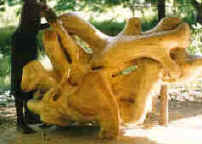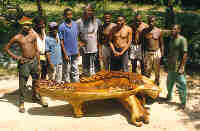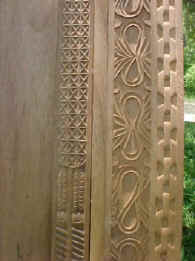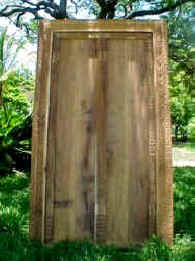FUNZI FURNITURE FACTORY
What do you get when you combine and Australian (Mike) with a
German (Sabine)? Why the Funzi Furniture Factory of course!
Page
1 Aussie Mike's African Home
Page
2 - The Funzi Furniture Factory
Page
3 - Mikes Work and Tips and Techniques
Page
4 - Mike and Sabine's Personal Paradise
Page
5 - Sabine's Work and Mike's New Project
|
Most of the work at Funzi Factory is carried out "Jua Kali" or in the open as you see to the right. The labor is all local and about 20 workers from a nearby village are employed. You can see their pride in the group picture. Mike has an interesting slant on the tools of the trade, not characteristic of most woodworkers who are always looking for the latest and greatest to be manufactured. He tells us: "Most of the tools we use here are locally manufactured from old car springs and the like. We use not much more than a chisel or an adze. Even our hammers are made from tree branches." When asked what tools were on his wish list, Mike replied,"None. I hate electricity! I bought an electric saw once. It lasted a week and made a lot of noise. My workforce here are not used to such things. Who wants to cut a straight line anyway?" The table that you see the workers gathered around is one of the amazing 'elephant tables' created at Funzi Furniture Factory. However, this is not the one with the most artistry or the most unusual story. We have that one in our Amazing Projects section. To read about it and see the picture just click on the link below:
|
|
 |
Here you see a neem tree root. It was rescued from the Shimba Hills when a new road needed to be built. There are several more years of drying and years of carving before it becomes a one off unique piece of furniture. In describing his favorite wood, Mike says: "My favorite wood is Iroko. We call it Mvule. (Note: You see it used as a table top on the first page.) Some call it African Teak. The one I favor is the Ugandan variety. It grows in a sandier soil than most others I have come across. When finished in oil it is a supurbly rich golden color with massive depth. We also use Mahogany and Camphor, but less so...Sadly most of these woods are becoming most rare. I do not fell trees for my work. Our Funzi Furniture is really a farmed wood called Boriti. The wood I use for my other work I collect from the beach or from dead trees in the bush." |
|
Here is a handcarved Lamu Door in Mike's favorite wood - Mvule. And close up it really does resemble Teak. These massive doors and other styles of them are one of the types of products produced at the Funzi Furniture Factory, which is now managed mainly by Sabine. Note the amazing symetry in the carvers art, incorporating almost a 'chip carving' effect on some areas with the more traditional carving interspersed throughout the design. This is a very good demonstration of the masterful grasp these African woodworkers have of the art of woodcarving. As in other countries we have featured on these pages, the fine old traditional techniques are evident in the finished products. In commenting on the finish they use most at the Funzi Factory, Mike told us, "We use linseed oil mainly. It is more adapted to 'repairs' than anything else and has a great finish that allows you to see the wood. The epoxy alternatives and others are not as durable with our weather conditions. It is hot here!" In talking about the shop where these unique pieces are constructed, Mike gives us a glimpse of the Funzi Factory. He says, "We now have a factory. Well, we call it a factory. In real terms, It is an open sided shelter with a thatched palm tree roof. We have 10 staff all working here together. We do not use electricity. The grounds around the workshop are surrounded with tropical palms. Really, Sabine's palm nursery. It is an easy place to work." |
|
CONTACT US AT mailto:sawdustone@earthlink.net
Copyright © 2001-2002 Sawdust Studios. All Rights Reserved




